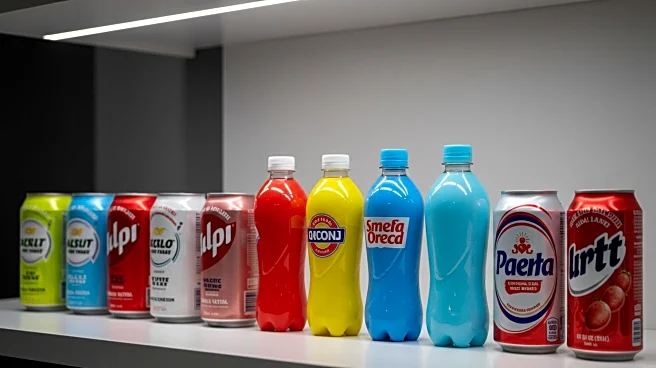What is the story about?
What's Happening?
The UK government is considering changes to the Soft Drinks Industry Levy (SDIL), which was introduced in 2018 to reduce sugar intake from sugary drinks and encourage reformulation across the beverage industry. The proposed changes include lowering the sugar threshold from 5g to 4g per 100ml and removing exemptions for milk-based drinks and their plant-based counterparts. These changes aim to further reduce sugar consumption, as a significant portion of sugar intake from soft drinks currently falls within the 4-5g band. The SDIL has been successful in driving reformulation, leading to a decrease in sugar consumption among children and adults. However, the proposed changes could have significant implications for beverage manufacturers, particularly smaller brands that may struggle to absorb the costs associated with reformulation and potential reduced sales.
Why It's Important?
The expansion of the sugar tax could have a profound impact on the UK beverage market, particularly for small and medium-sized enterprises (SMEs) that may face financial challenges due to increased costs. The proposed changes could undermine years of investment in reformulation and affect the vitality of many SMEs already dealing with rising input costs. Additionally, the removal of exemptions for milk-based drinks could impact the dairy industry, as many sugary dairy drinks would no longer be exempt from the tax. The changes could drive further reformulation efforts, leading to the introduction of more zero or low sugar alternatives, but may also result in higher prices for consumers as manufacturers pass on the increased costs.
What's Next?
The UK government has closed its consultation on the proposed levy changes and is expected to announce its next steps. Manufacturers will need to decide how to respond, with options including introducing new zero sugar variants, reformulating existing products to meet the new threshold, or increasing prices on products affected by the legislation. The government will also need to determine the specifics of the lactose allowance for dairy drinks, which could influence the impact of the tax on the dairy industry. The outcome of these decisions will shape the future of the UK beverage market and its approach to sugar reduction.
Beyond the Headlines
The proposed changes to the sugar tax highlight the ongoing efforts to address public health concerns related to sugar consumption. The expansion of the tax could lead to broader discussions on the role of government policy in influencing consumer behavior and industry practices. Additionally, the impact on small businesses raises questions about the balance between public health objectives and economic sustainability for SMEs. The changes could also prompt innovation in the beverage industry, as manufacturers seek to develop new products that meet consumer demand for healthier options.
















